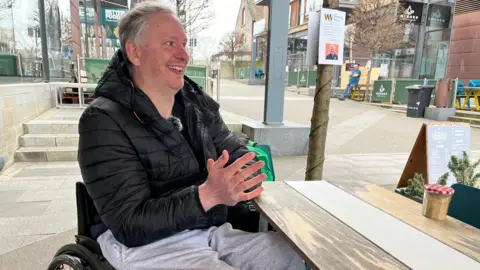Disabled teacher slams changes to benefits system
 BBC
BBCA paralysed man has criticised government plans to reform the Personal Independence Payment (Pip) system.
The government is planning to change the eligibility criteria for Pip as part of its attempt to try and save £5bn from the welfare bill.
Pip payments are made to those who have difficulty completing everyday tasks or getting around as a result of a long-term physical or mental health condition.
Stephen Lightbown, from Hanham near Bristol, receives about £4,000 a year from Pip, and said: "The cost of living with a disability is extortionate."
Mr Lightbown, who works part time as a self-employed teacher, was paralysed in a sledging accident when he was 16 years old and has been claiming benefits for a number of years.
"My first benefits were the Disability Living Allowance, then Pips was introduced, you have to re-apply for it every few years.
"I'm currently on my second run. You apply for it through a form and then an assessor comes to see you at home.
"I think that actually they need to assess us outside the house, walk down the street with me for 10 minutes to see the numbers of shops I can't get into, those that don't have wheelchair access, shops where things are too high up."

The government sees tightening up the number of people who are eligible for Pip as a way to help reduce benefits payments.
It is also thought that this could encourage people, who are out of work because of long-term sickness, back into work.
Government figures suggest there are 2.8 million people out of work because of long-term sickness, while one in 10 people of working age are claiming a sickness or disability benefit.
Mr Lightbown said that the concept of Pip replacing employment is a myth.
"I get just over £4,000 a year from Pips.
"That is not a replacement of a salary - it's nowhere near. I'm not, not working because I get Pips, I'm not trying to fudge the system."
'Broken system'
The Labour MP for Filton and Bradley Stoke, Claire Hazelgrove, says the government's decision is a tough one but thinks it will help in the long run.
"What's important to say here is individual cases are different, I know from my own experience of my sister having learning disabilities.
"The principles around this reform that we have seen this week are important, we need to make sure that those who cannot work get the support they need.
"Those who can work, we have a broken system which has been keeping people out of work for too long and we need to get people back into work."
Follow BBC Bristol on Facebook, X and Instagram. Send your story ideas to us on email or via WhatsApp on 0800 313 4630.
